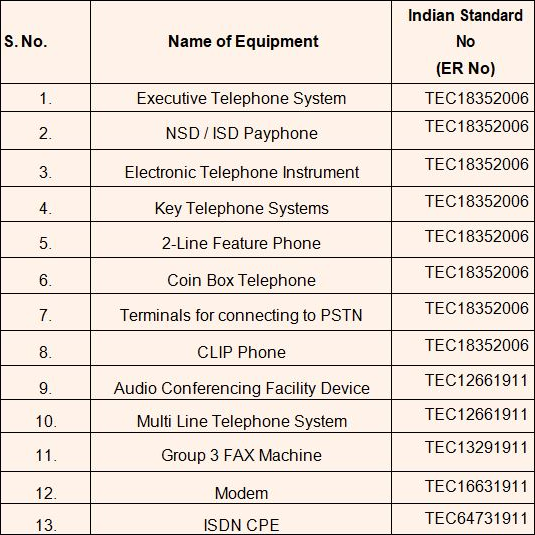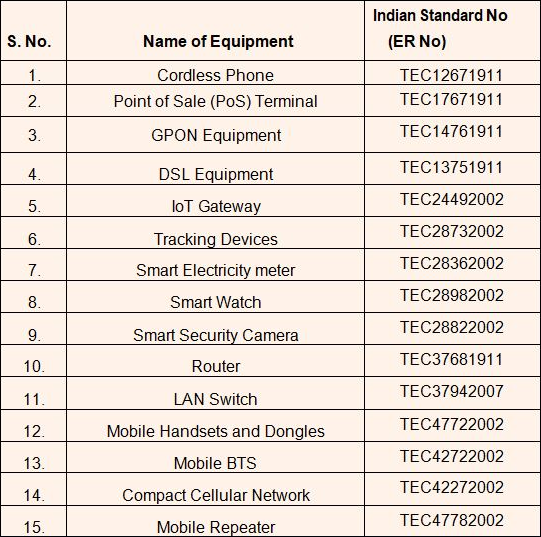What is TEC Certification?
TEC stands for Telecommunication Engineering Center. TEC Certification is a professional standards and testing organization for the Ministry of Telecommunications of the Government of India. TEC undertakes mandatory testing and certification prior to sale, import or use in India for the telecommunications industry.
Why do your products need TEC Certification?
TEC, or Telecommunications Engineering Center, issues the mandatory certificate after proper testing and verification of telecommunications products. TEC works under DoT or the Department of Telecommunications of the Government of India.
According to the India National Policy 2012 and the India Telegraph Rules (Amendment) 2017, all certified products must bear the TEC Certified seal. They must adhere to the strict guidelines of TEC analysts. Testing and certification of all telecommunications products are essential for secure connectivity and seamless operation on the current and future network.
Where can TEC certification be done?
There are four Regional Telecom Engineering Centers (RTECs) that are located in New Delhi, Bangalore, Mumbai, and Kolkata, for the purpose of testing. TEC will test the equipment to ensure conformance with essential requirements, and based on the results of their test, a certificate will be issued by TEC. We are delighted to share that LIASION EMPIRE (VB Consultants) is TEC certified. As a result of the certification process, our analysts monitor a product's RFI ratings to ensure that it is properly represented in TEC's Evaluation centers and Showcases.
TEC Certification Guidelines & Objectives
-
Any Original Equipment Manufacturer/Importer/Distributor (OEM) wishing to sell or import telecommunications equipment in India must acquire the TEC certificate and affix the equipment with the appropriate certification label.
-
The certification only needs to be obtained once for a device model and is valid for any quantity of the certified device model. Another device model requires a separate certification.
-
The issued certificates will be legitimate for 5 years from the date of issue.
-
TEC may change/suspend/cancel the certificate if TEC learns that there has been a violation of rules.
The certification process seeks to promote:
- That no telecom equipment degrades the performance of the existing network to which it is linked.
-
End user security;
-
This telecommunications equipment complies with relevant national and international government standards and requirements.
TEC Certification Schemes
- General Certification Scheme (GCS)
-
This scheme applies to all telecommunications equipment listed in Table 1 of Annex I and indicated in the GCS. The updated version of this list is available on the MTCTE portal. ADD a link here
-
As part of this scheme, the applicant is required to submit the test-related conformance along with test reports regarding the parameters contained in the ERs of each designated CAB or recognised CAB of the MRA partner country. Test results must to evaluated for compliance with the respective ERs.
- Simplified Certification Scheme (SCS)
-
This scheme is relevant for all system indexed in Table-1 of the Annexure-I in opposition to which SCS is indicated. ADD
-
As part of this scheme, the applicant has required to submit an evidence-based conformance sheet along with a Self-Declaration of Conformity (SDoC) regarding the parameters contained in the ERs.
What are the most important TEC requirements?
- Generic Requirement (GR)
-
It refers to a number of requirements related to performance and functionality, in addition to the product interface requirement.
- Service Requirement (SR)
-
It refers to a set of TEC requirements / specifications in terms of implementation obligations, quality of service, etc., as prescribed by the licensor in the respective license.
- Interface Requirements (IR)
-
The IR emitted by TEC ensures that telecommunication devices comply with the EMI / EMC (Electromagnetic Interference / Electromagnetic Compatibility) safety standards set by TEC and interact properly with the other products / networks of the Indian Telecommunication Network.
Why TEC?
According to the Mandatory Telecommunications Equipment Testing and Certification (MTCTE) guidelines, the Telegraphs of India (Modified) Rules, 2017, states that all telecommunications devices must undergo mandatory testing and certification before being sold, imported or used in India. The latest detailed procedure for mandatory testing and certification of telecommunications equipment (MTCTE) in accordance with these rules has been communicated separately. A certificate shall be issued after TEC certifies that test reports provided by the Indian accredited laboratories confirm that the equipment is in compliance with the essential requirements.
Final Steps to be followed for TEC Application
-
The applicant must submit his application at the respective TEC regional office according to the geographical area.
-
The applicant must complete form A and send it to RTEC along with the required documents. Notify the applicant if the Form A and other documents are satisfactory. The applicant must deposit an examination fee indicating the unique reference number.
-
Defines the category of test equipment. The fee structure for TEC certification by device category is available online.
-
The test fee must to paid online through the NTRP portal. When paying the fee, please include the unique reference number provided by RTEC.
-
After successful payment, the applicant submits a duly completed registration form (Form B) along with the online receipt of the fees paid.
-
If the Form B and exam fees are correct, the application shall have recorded.
- The test plan and tests carried out in accordance with the Test Schedule and Test Procedure (TSTP) prescribed by TEC for certain GR / IR
- TEC will issue approval certificates after a final touch of testing.
-
Validity: the TEC certificate is valid for five years.
List of Products Covered under MTCTE (SCS)

List of Products Covered under MTCTE (GCS)

